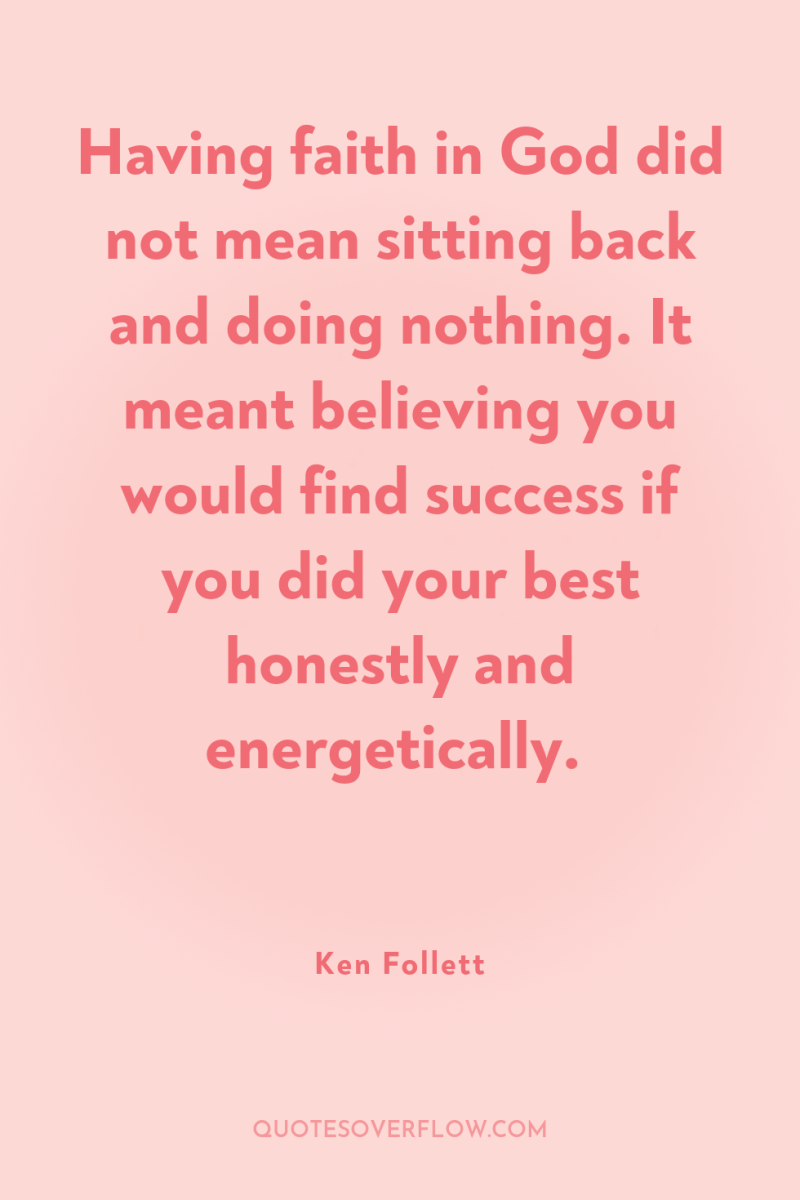
1
Having faith in God did not mean sitting back and doing nothing. It meant believing you would find success if you did your best honestly and energetically.Ken Follett
2
I think there are two kinds of marriage, " Ethel said thoughtfully. "One is a comfortable partnership, where two people share the same hopes and fears, raise children as a team, and give each other comfort and help." She was talking about herself and Bernie, Daisy realized. "The other is a wild passion, madness and joy and sex, possibly with someone completely unsuitable, maybe someone you don't admire or don't even really like." She was thinking about her affair with Fitz, Daisy felt sure. She held her breath: she knew Ethel was now telling her the raw truth. "I've been lucky. I've had both, " Ethel said. "And here's my advice to you. If you get the chance of the mad kind of love, grab it with both hands, and to hell with the consequences.Ken Follett
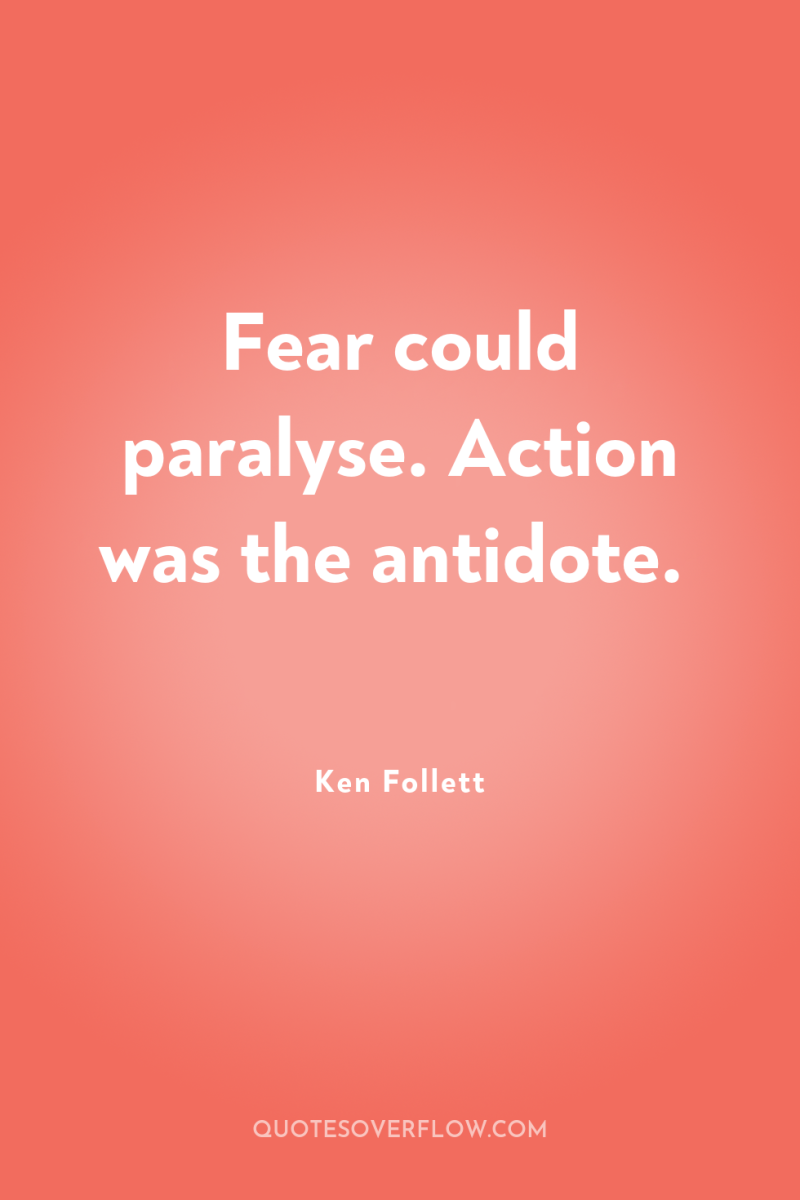
3
Fear could paralyse. Action was the antidote.Ken Follett
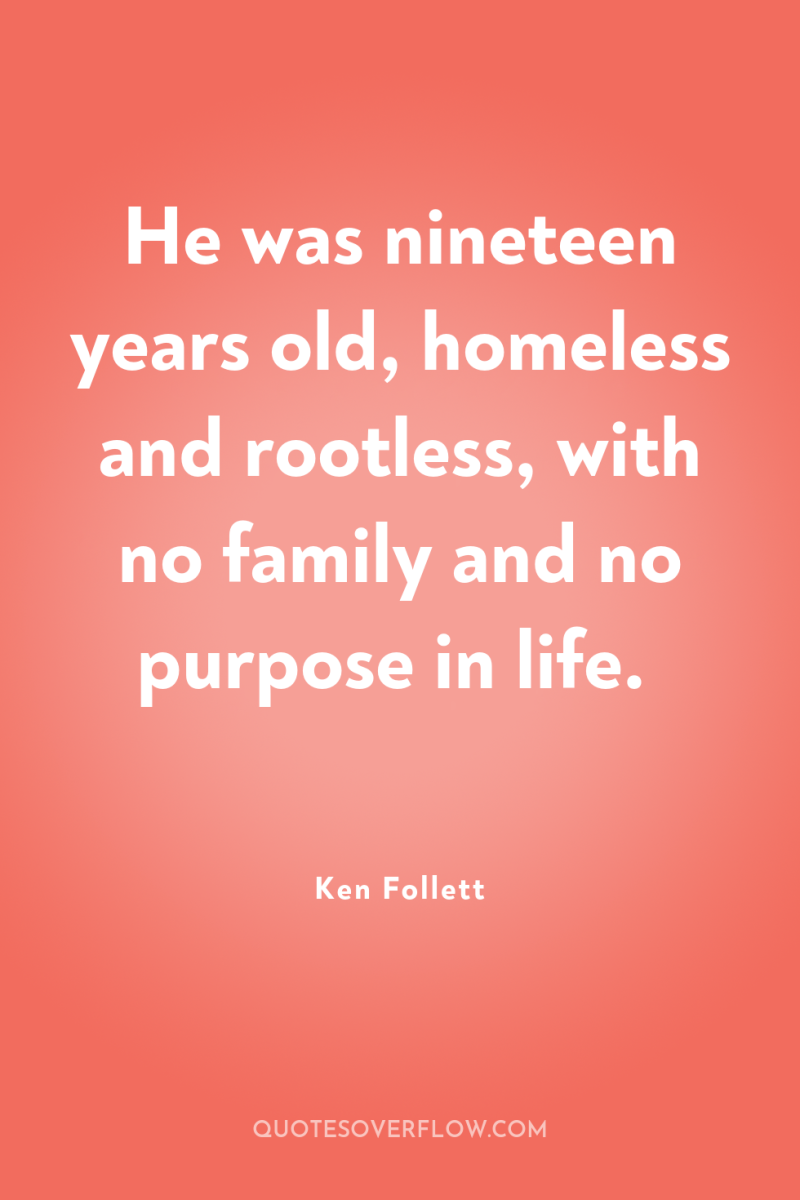
4
He was nineteen years old, homeless and rootless, with no family and no purpose in life.Ken Follett
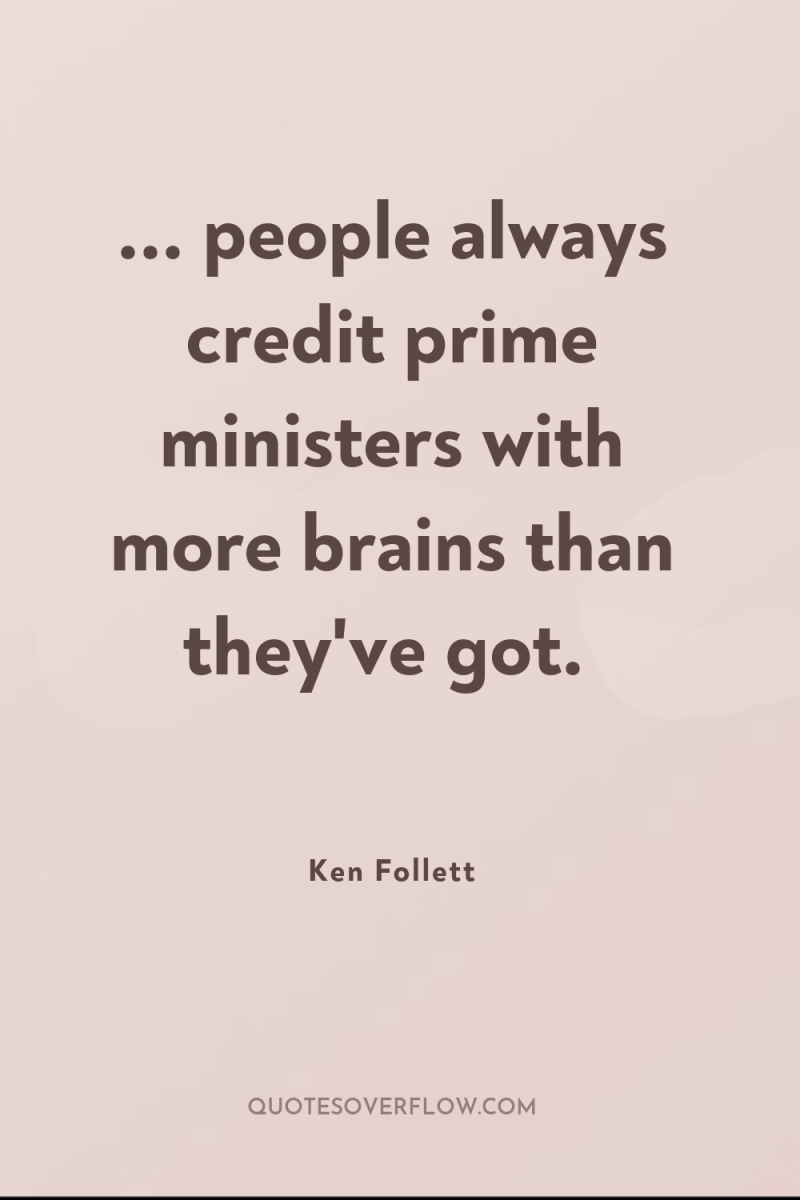
5
... people always credit prime ministers with more brains than they've got.Ken Follett
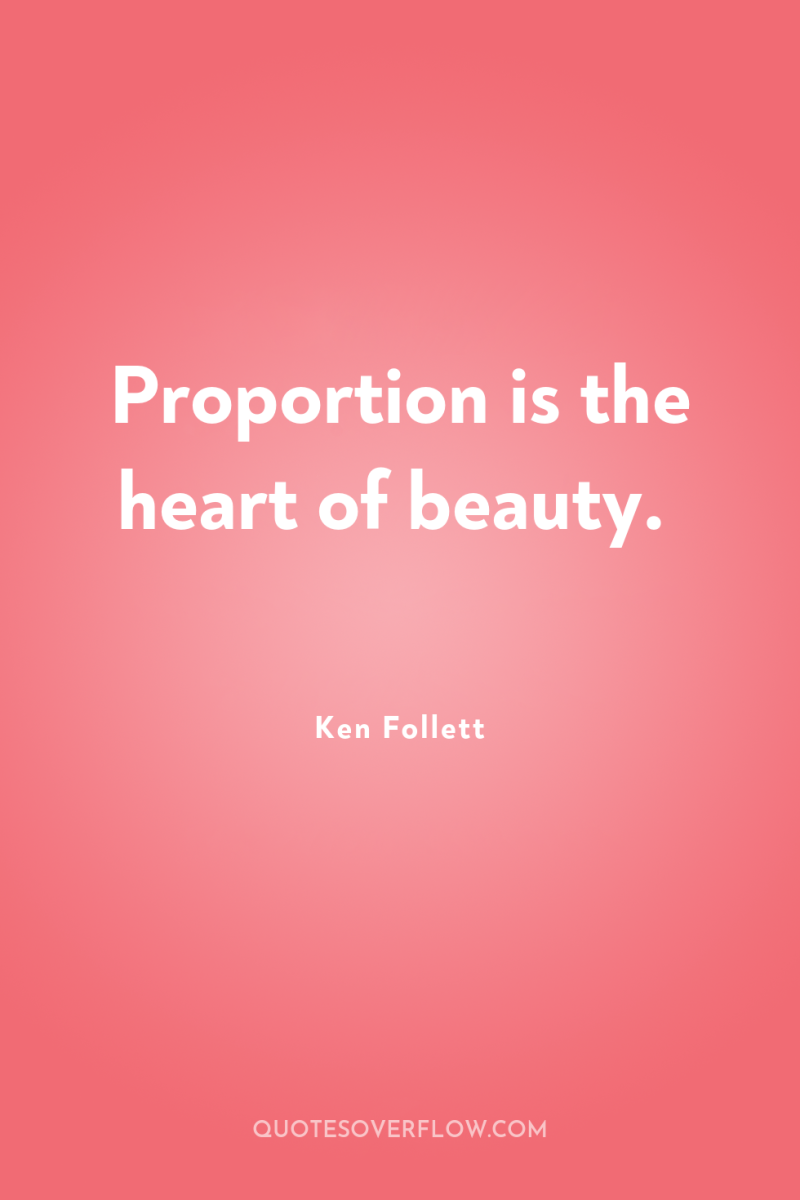
6
Proportion is the heart of beauty.Ken Follett
7
Jack was too absorbed in his work to hear the bell. He was mesmerized by the challenge of making soft, round shapes of hard rock. The stone had a will of its own, and if he tried to make it do something it did not want to do, it would fight him, and his chisel would slip, or dig in too deeply, spoiling the shapes. But once he had got to know the lump of rock in front of him he could transform it. The more difficult the task, the more fascinated he was. He was beginning to feel that the decorative carving demanded by Tom was too easy. Zigzags, lozenges, dogtooth, spirals and plain roll moldings bored him, and even these leaves were rather stiff and repetitive. He wanted to curve natural-looking foliage, pliable and irregular, and copy the different shapes of real leaves, oak and ash and birch.Ken Follett
8
No one's an angel - especially if he's a manKen Follett
9
You should first follow the plow if you want to dance the harvest jig.Ken Follett
10
Hard work should be rewarded by good food.Ken Follett
11
Aliena's brother, Richard, sometimes reminded her of her father, with a look or a gesture, and that was when she felt a surge of affection.Ken Follett
12
It pleased Aliena that they were all together: she and Jack and their children, and Jack's mother, and Aliena's brother, and Martha. It was quite like an ordinary family, and Aliena could almost forget that her father had died in a dungeon, and she was legally married to Jack's stepbrother, and Ellen was an outlaw, and– She shook her head. It was no use pretending this was a normal family.Ken Follett
13
If we're all aggressive, obedient solders [sic], who's going to write the poems and play the blues and go on anti-war protest marches?Ken Follett
14
They did not suspect her for a moment. It did not occur to them that a woman could be dangerous. How foolish they were. Women could do most of the things men did. Who was left in charge when the men were fighting wars, or going on crusades? There were women carpenters, dyers, tanners, bakers and brewers.Ken Follett
15
This was her destiny, and it was a fit and proper one. She was not unwilling, but she knew this was a fateful moment, and she had a sense of doors closing behind her and the path of her life being fixed irrevocably.Ken Follett
16
She shook her head in perplexity. "I'll never know where you got the idea that you were destined for greatness." She dropped the rest of the rabbit in the pot and begun to clean the underside of its skin. She would use the fur. "You certainly didn't inherit it from your forebears.Ken Follett
17
Ishmael was looking at him through narrowed eyes. “This is very important to you, this box.”“ It’s important to the world.” Ishmael said: “The sun rises, and the sun sets. Sometimes it rains. We live, then we die.” He shrugged. He would never understand, Wolff thought; but others would.Ken Follett
18
It was the study hour. Most of the monks were reading. A few were meditating, an activity that was suspiciously similar to dozing.Ken Follett
19
Being a monk was the strangest and most perverted way of life imaginable. Monks spent half their lives putting themselves through pain and discomfort that they could easily avoid, and the other half muttering meaningless mumbo jumbo in empty churches at all hours of the day and night. They deliberately shunned anything good–girls, sports, feasting and family life.Ken Follett
20
Everything in Tom's cathedral looked as if it was meant to be. Perhaps her life was like that, everything foreordained in a grand design, and she was like a foolish builder who wanted a waterfall in the chancel.Ken Follett
21
Englishmen did not speak to strangers on trains ...Ken Follett
22
A chill December morning dawned, with rags and tatters of mist hanging on the trees like poor people’s washing.Ken Follett
23
I don't think it really matters whether parents are strict or lenient, as long as they're consistent. Kids can live with more or less any set of rules so long as they know what they are. It's arbitrary tyranny that gets them mixed up.Ken Follett
24
In the dynamics of the main family of the story, a rising socialist in England's postwar government expects his grandparents to be pleased that the local aristocrat's garden is commandeered to allow the people to get coal underneath. Instead, the grandparents grieve because the garden represents something more than a resource to be divided. It is a symbol of community and beauty.Ken Follett
25
Why do you have to be the same as the others? ...Most of them are stupid.Ken Follett
26
The first casualty of a civil war was justice, Philip had realized.Ken Follett
27
When I'm brave and strong, and care for children and the sick and the poor, I become a better person. And when I'm cruel, cowardly, or tell lies, or get drunk, I turn into someone less worthy, and I can't respect myself. That's the divine retribution I believe inKen Follett
28
When you're thinking, please remember this: excessive pride is a familiar sin, but a man may just as easily frustrate the will of God through excessive humility.Ken Follett
29
Two blades clashed, ringing like a bell. Like all small boys, Philip thought his father was invincible; and this was the moment when he learned the truth.Ken Follett
30
Americans talked about voters the same way Russians talked about Stalin. They had to be obeyed.Ken Follett
31
Fathers were supposed to be invulnerable - but that attitude was childish, he now saw. Irritatingly, he might have to change his outlook. He could no longer be merely indignant and resentful. He was not the only sufferer. Dad had hurt him, but he had hurt Dad as well, and they were both responsible. Feeling responsible was not as comfortable as feeling outraged.Ken Follett
32
All his life he would cherish the memory of an endless caravan of camels alongside the railway line, the laden beasts plodding patiently through the snow, ignoring the twentieth century as it hurtled past them in a clash of iron and a shriek of steam.Ken Follett
33
Most rich people have a gangster in their ancestry somewhere.Ken Follett
34
In the grounds of the château was a churchsaid to date from the year 1000, and he went to look at it, but he had never really understood what people saw in oldchurches.Ken Follett
35
In the grounds of the château was a church said to date from the year 1000, and he went to look at it, but he had never really understood what people saw in old churches.Ken Follett
36
He had forgotten that God saw through the silk robes to the sinful heart, that the only wealth worth having was treasure in heaven, and that even the king had to kneel down in church. Feeling that everyone else was so much more powerful and sophisticated than he was, he had lost sight of his true values, suspended his critical faculties, and placed his trust in his superiors. His reward had been treachery.Ken Follett
37
And where are you going?" His voice was playfully challenging. "To get some breakfast, " she said without stopping. He leered. "I've got something for you to eat, " he called after her." I might bite it off, though, " she said over her shoulder.Ken Follett
38
Monks committed all the same sins that ordinary people did. He had just been shocked by the woman's shamelessness. The sight of her nakedness remained with him, the way the hot heart of a candle flame, stared at for a few moments, would burn on behind closed eyelids.Ken Follett
39
Philip looked incredulously at the tiny bundle in Johnny’s arms. He reached out a hand tentatively, and lifted a corner of the blanket. He saw a wrinkled pink face, an open toothless mouth and a little bald head–a miniature of an aging monk.Ken Follett
40
When he thought about how he had been slighted, condescended to, manipulated and deceived, he became angry. Obedience was a monastic virtue, but outside the cloisters it had its drawbacks, he thought bitterly. The world of power and property demanded that a man be suspicious, demanding, and insistent.Ken Follett
41
The war taught me that nothing counts as much as loyalty" "Bullshit. you still haven't learned that when humans are under pressure, we're all willing to lie" "even to the people we care?" "we lie more to our loved ones, because we care about them so damn much. why do you think we tell the truth to priests and shrinks and total strangers we meet on trains? it's because we don't love them, so we don't care what they think.Ken Follett
42
Why is it that those who want to destroy everything good about their country are the quickest to waive the national flag?Ken Follett
43
She was unique: there was something abnormal about her, and it was that abnormal something that made her magnetic.Ken Follett
44
He was looking forward eagerly to seeing her again. He had coped perfectly well on his own, of course, but it was very reassuring to have someone in your life who was always ready to fight for you, and he had missed that comforting feeling,Ken Follett
45
... sentiments which Feliks had already come to recognise as being characteristic of The Times, which would have described the Four Horsemen of the Apocalypse as strong rulers who could do nothing but good for the stability of the international situation.Ken Follett
46
Politicians often had the knack of seeming to know everyone intimately. Either they had remarkable memories, or their secretaries reminded them efficiently.Ken Follett
47
World War II is the greatest drama in human history, the biggest war ever and a true battle of good and evil. I imagine writers will continue to get stories from it, and readers will continue to love them, for many more years.Ken Follett
48
One of the hardest things for me, now that I'm famous, is finding people who can read my stuff and give me an honest critique.Ken Follett
49
In my books, women often solve the problem. Even if the woman is not the hero, she's a strong character. She does change the plot. She'll often rescue the male character from some situation.Ken Follett
50
With hindsight, we see that the Soviet Union never had a chance of world domination, but we didn't know that then.Ken Follett